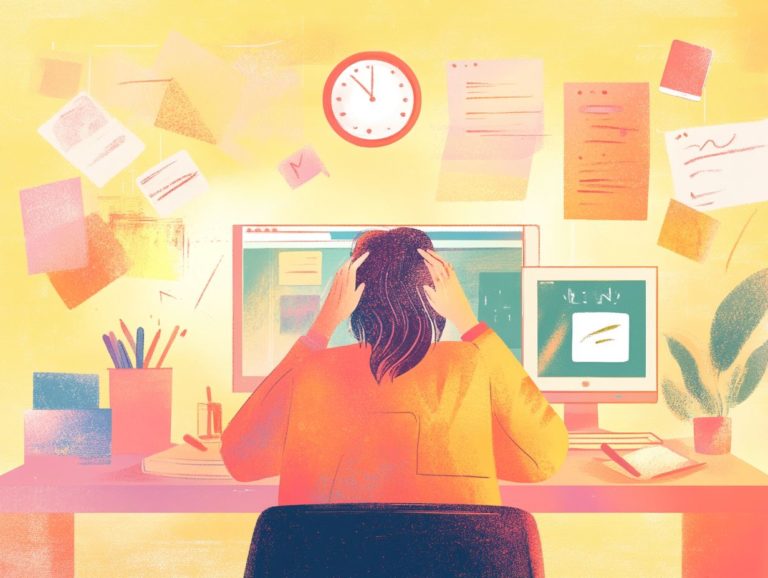10 Tips for Reducing Time Wasters
In today s fast-paced world, managing your time effectively is more crucial than ever. With distractions lurking around every corner, staying productive can feel like an uphill battle. This article offers ten practical tips designed to help you identify and reduce time wasters, prioritize your tasks, and set clear, achievable goals.
You’ll uncover strategies to minimize interruptions, delegate effectively, and practice self-care, all while boosting your efficiency and maintaining your well-being. Join us on this journey to reclaim your time and skyrocket your productivity!
Contents
- Key Takeaways:
- 1. Identify Your Time Wasters
- 2. Prioritize Your Tasks
- 3. Set Clear Goals and Deadlines
- Summary
- 4. Create a Schedule and Stick to It
- 5. Minimize Distractions
- 6. Delegate Tasks When Possible
- 7. Take Breaks and Practice Self-Care
- 8. Use Time Management Tools
- 9. Learn to Say No
- 10. Reflect and Adjust Your Habits
- Why Is It Important to Reduce Time Wasters?
- Frequently Asked Questions
- What are some common time wasters that people encounter in their daily lives?
- How can I prioritize my tasks to avoid wasting time?
- How can I avoid getting sidetracked by distractions?
- What can I do to stay focused and motivated throughout the day?
- Is it beneficial to say “no” to certain tasks or commitments?
- How can I improve my time management skills to reduce time wasters?
Key Takeaways:
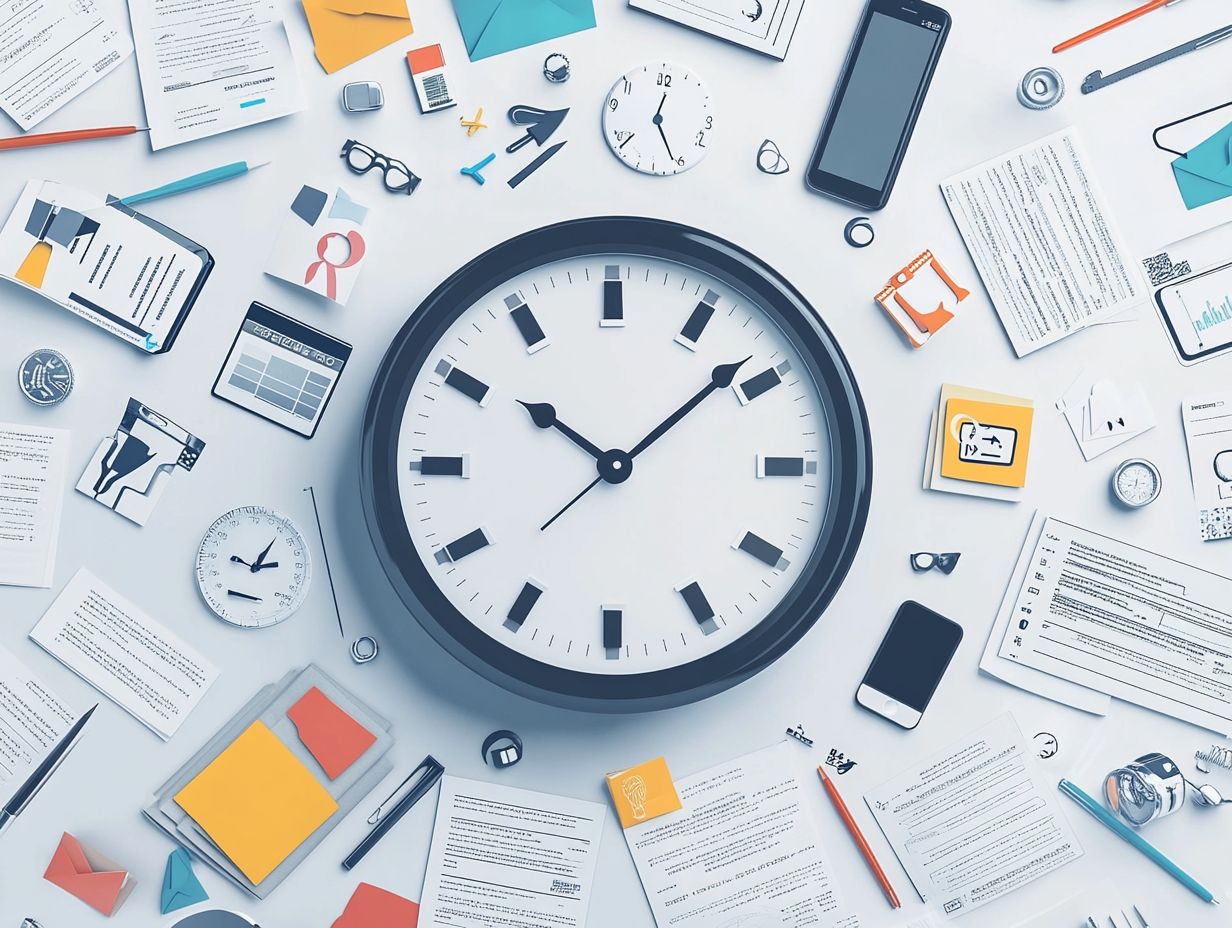
- Identify your time wasters to better understand how to manage them.
- Prioritize tasks to focus on the most important and urgent tasks first.
- Set clear goals and deadlines to stay motivated and on track.
1. Identify Your Time Wasters
Identifying your time wasters is the essential first step toward optimizing productivity and enhancing overall engagement in your workplace. By recognizing the various distractions that hinder your progress like social media scrolling and an overflowing email inbox you can take command of your schedule.
This self-awareness serves as a mirror, reflecting habits that consume your precious time without yielding meaningful outcomes. For example, incessantly checking social media doesn t just interrupt your flow; it can lead to a significant time commitment that pulls you away from essential tasks. Attending meetings without a clear agenda can squander hours that could be better spent.
To effectively pinpoint these habits, consider tracking the time you spend on various activities through journaling or using specialized time management apps. Discovering these patterns will empower you to reclaim your time and make more deliberate choices about how to allocate it wisely.
2. Prioritize Your Tasks
Prioritizing your tasks is crucial for maximizing productivity and ensuring that you focus on high-impact activities instead of falling prey to time wasters.
Utilizing techniques like the Eisenhower Matrix a tool that helps you differentiate between what s urgent and important or the ABC prioritization method, which categorizes tasks into three tiers of importance, can significantly enhance your ability to concentrate on what truly matters.
This structured approach streamlines your workflow and reduces feelings of overwhelm. A clear set of priorities allows you to allocate your time efficiently, creating a more balanced work-life rhythm. When you organize tasks thoughtfully, managing various responsibilities becomes much easier, allowing you to spend more quality time away from work and fostering overall well-being.
3. Set Clear Goals and Deadlines
Setting clear goals and deadlines can significantly boost your productivity by providing a structured framework that steers your daily activities and helps you sidestep time-wasting distractions.
Incorporating the SMART criteria Specific, Measurable, Achievable, Relevant, and Time-bound ensures that your objectives are not just well-defined but also attainable. This leads to more efficient task delegation within your teams. Using these principles fosters a focused environment where everyone understands their roles and priorities, reducing confusion and enhancing accountability.
To effectively track progress, consider employing tools like Gantt charts a visual project timeline or project management software. These resources offer visual insights and milestones, making it easier for your teams to adapt strategies and stay aligned with their goals. Regularly reviewing these goals cultivates a culture of continuous improvement and motivates everyone to reach for success.
Summary
By identifying time wasters, prioritizing tasks, and setting clear goals, you can reclaim control over your time and significantly enhance your productivity. Remember, the journey to effective time management is ongoing, but the rewards greater efficiency and well-being are well worth the effort.
4. Create a Schedule and Stick to It
Creating a schedule and sticking to it can greatly boost your productivity. By allocating specific time slots for tasks, you minimize distractions from time-wasters like social media and email overload.
Utilizing techniques such as setting aside specific times for each task proves particularly effective. This allows you to designate uninterrupted periods for focused work. By breaking your day into defined segments, you manage priorities more effectively and keep track of various responsibilities.
Digital calendars are powerful allies in this endeavor. They enable you to seamlessly organize commitments and set reminders, ensuring no task slips through the cracks.
While structure is invaluable, embrace flexibility. Adapting your schedule in response to unexpected challenges fosters sustainable productivity without compromising overall efficiency.
5. Minimize Distractions
Minimizing distractions is crucial for maintaining high productivity levels. By proactively tackling common time-wasters like social media and unnecessary meetings, you cultivate a more focused work environment.
One effective strategy is to create a dedicated workspace. This helps you associate specific areas with concentrated work, free from distractions. Implementing focus techniques like the Pomodoro Technique offers structured intervals for work and breaks, significantly enhancing your overall efficiency.
Employ effective communication methods, such as setting do not disturb times or utilizing collaborative tools. This minimizes interruptions from colleagues, allowing you to tackle important tasks without constant disruptions.
By combining these approaches, you foster an environment that promotes productivity, enabling you to achieve your goals more efficiently.
6. Delegate Tasks When Possible
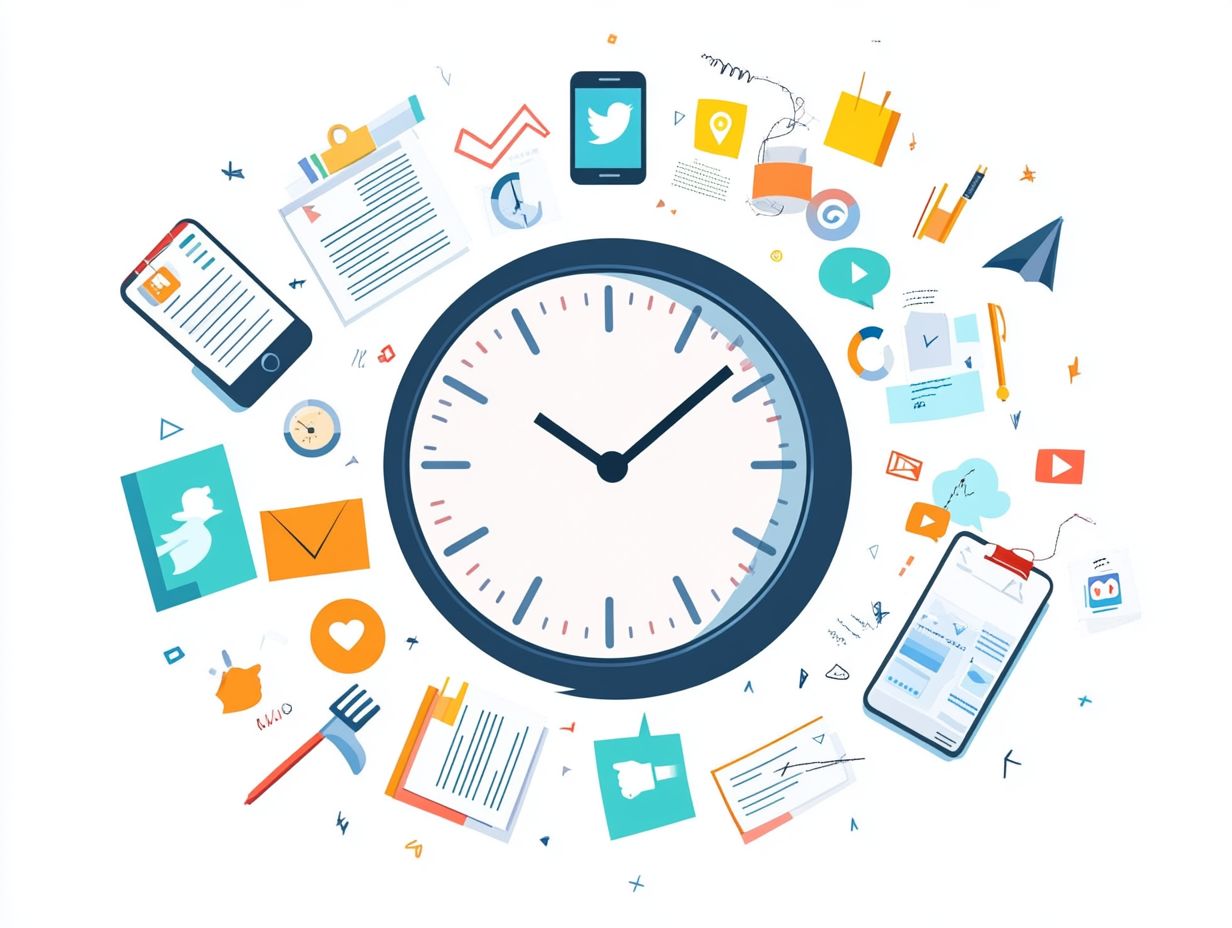
Task delegation is a powerful strategy for enhancing your productivity and overall well-being. By focusing on high-priority tasks, you effectively reduce the burden of time-wasting activities.
When you entrust certain responsibilities to others, you ll notice substantial improvements in efficiency. This enables both you and your team to accomplish more in less time. You ll feel a weight lift off your shoulders as you share tasks!
To delegate effectively, it s crucial to communicate clearly about what needs to be done and the expected outcomes. Setting specific expectations and deadlines ensures accountability, allowing everyone involved to excel in their roles while fostering a sense of collaboration and trust within the team.
7. Take Breaks and Practice Self-Care
Taking regular breaks and prioritizing self-care is essential for maintaining productivity and preventing burnout. These practices reduce stress and elevate your overall well-being.
Research indicates that short, intentional pauses during work can significantly enhance your concentration and creativity. Your brain thrives on downtime, using it to process and synthesize information more effectively. By stepping away from your tasks, you often return with a refreshed perspective that leads to innovative solutions.
Embracing self-care strategies, such as mindfulness exercises or leisurely walks, promotes a healthier work-life balance. These practices rejuvenate your mind and help you connect more deeply with your own needs.
This connection ultimately paves the way for sustained motivation and improved performance in both your professional and personal life. Start implementing these tips today for a better work-life balance!
8. Use Time Management Tools
Utilizing time management tools can significantly elevate your productivity. These tools provide essential frameworks to prioritize tasks, track your progress, and minimize time wasters.
These tools come in many forms, including task management applications that let you create to-do lists, set deadlines, and categorize tasks by priority levels. Calendar software is also vital for scheduling your commitments and reminding you of important dates and deadlines.
By leveraging these technologies, you can streamline your daily routine and adopt organizational strategies that fit your unique work style. Tools that help teams work together better can enhance teamwork, enabling groups to coordinate tasks and share progress updates effectively.
9. Learn to Say No
Saying no is a powerful skill that can keep you focused. It helps protect your time from unnecessary meetings and distractions that undermine productivity.
By setting clear boundaries, you can safeguard your personal and professional life from overcommitment and burnout. For example, if a colleague frequently asks for your help with minor tasks, politely declining can free up precious hours.
In social situations, having the confidence to decline invitations that interfere with essential rest or personal growth is crucial for your well-being. Use effective communication techniques like expressing gratitude and suggesting alternatives to convey your message without guilt.
Remember, prioritizing your own needs is not just acceptable; it s essential for your success and happiness.
10. Reflect and Adjust Your Habits
Reflecting on and adjusting your habits is essential for enhancing productivity. Regularly assessing your performance helps identify time wasters and develop more effective organizational strategies.
Taking a moment to step back gives valuable insights into your daily routines and long-term goals. This self-awareness enables you to focus on tasks that align with your personal and professional objectives.
Create a simple system to check how you re doing. This fosters an environment where continuous improvement is within reach. By integrating small, actionable changes, you can pave the way for greater effectiveness and satisfaction in your pursuits.
Take a few minutes today to reflect on your habits and make a plan for improvement!
Why Is It Important to Reduce Time Wasters?
Reducing time wasters is essential for enhancing productivity, improving employee well-being, and creating a more engaged workplace. Implementing 8 quick tips for daily time management can help you actively work to eliminate distractions and inefficiencies, boosting performance and creating a healthier work environment.
Research indicates that employees waste an average of 2.1 hours each day over ten hours a week significantly hindering overall output. Start using strategies now to crush those time-wasting habits and see a remarkable 25% increase in worker productivity.
But it’s not just about the numbers; a streamlined work process can lift employee morale, making individuals feel more accomplished and less stressed. By fostering a culture that emphasizes efficient time management, you enhance collaboration and innovation, ultimately propelling your organization toward its goals more effectively.
Implement these strategies today and watch your productivity soar!
What Are the Common Time Wasters in the Workplace?
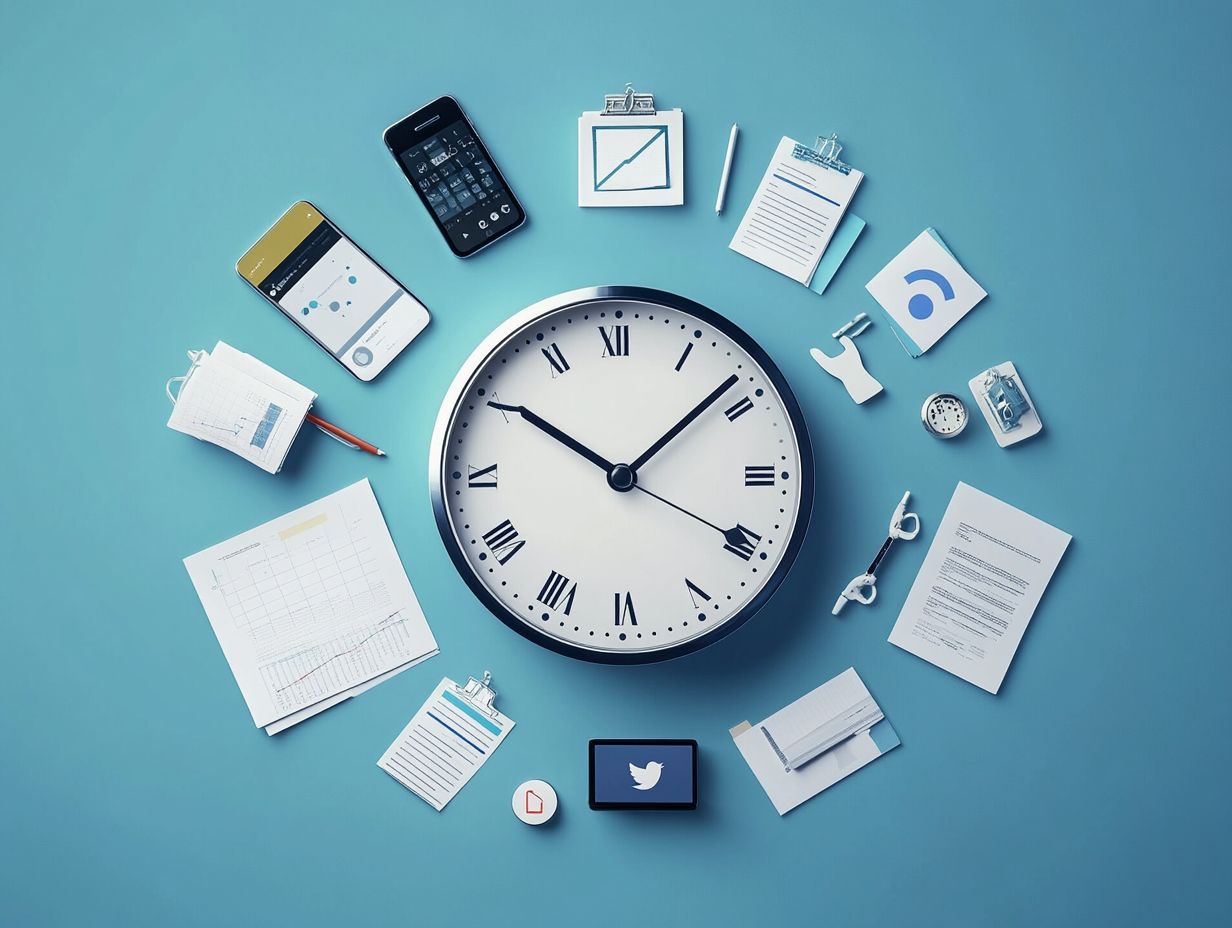
Common time wasters in the workplace often include lots of emails, endless meetings, and the irresistible pull of social media. Each of these can significantly derail your productivity and focus.
Consider the relentless flow of emails that can leave you feeling overwhelmed. It makes it difficult to prioritize your tasks effectively. Excessive meetings frequently veer off-topic, consuming precious hours that would be far better spent on actual project work. The siren call of social media can easily lure you away from your responsibilities, leading to lost focus and missed deadlines.
To combat these distractions, you ll be amazed at how much more focused you’ll be by designating specific times for checking emails, implementing a strict agenda for meetings, and employing website blockers during work hours. This approach can help you maintain concentration and enhance your overall efficiency.
How Can Time Wasters Affect Productivity and Efficiency?
Time wasters can severely impact your productivity and efficiency. They result in diminished performance, heightened stress, and even the risk of burnout among employees.
Distractions like incessant notifications, unproductive meetings, and aimless social media browsing can throw your project timelines off course. When team members frequently interrupt their workflow to check emails or engage in casual chit-chat, they lose the essential momentum to complete tasks, leading to inevitable delays.
When one person s distraction affects others, it creates a ripple effect, straining team dynamics as frustration over unmet deadlines builds. This not only undermines individual contributions but can jeopardize the entire project. It highlights the urgent need to identify and address these time-wasting activities.
What Are Some Strategies for Avoiding Time Wasters?
Implementing effective strategies to avoid time wasters can significantly elevate your productivity. Techniques such as task prioritization, scheduled breaks, and minimizing distractions are essential.
Start by establishing a clear hierarchy of tasks. This will help you discern what demands immediate attention and what can be addressed later. Incorporating short, frequent breaks into your workflow gives you the chance to recharge, enhancing your focus when you return to your tasks.
It s equally important to identify and eliminate or reduce environments or situations that trigger distractions. This could mean turning off notifications or creating a dedicated workspace where you can truly concentrate.
Each of these strategies can be customized to align with your individual preferences and working styles. By tailoring your approach to resonate with your unique habits, you ll boost your efficiency and transform your workflow.
How Can Time Wasters Impact Mental Health and Well-Being?
Time wasters can significantly affect your mental health and overall well-being, leading to heightened stress, feelings of overwhelm, and diminished job satisfaction.
When you find yourself constantly distracted whether by endless notifications, unnecessary meetings, or vague task priorities your ability to focus takes a nosedive. This fragmented attention doesn’t just hinder your productivity; it also feeds into a cycle of anxiety and frustration.
Over time, the psychological burden of these inefficiencies can lead to burnout, leaving you feeling drained and emotionally detached from your work. By identifying and reducing these time-wasting elements, you can create a more supportive environment for yourself.
Such adjustments not only enhance your performance but also foster a healthier state of mind, enabling you to truly thrive in your role instead of just getting by.
Take Action: Start implementing these strategies today to manage time-wasters in your workplace and boost your productivity with these 10 tips for staying productive and avoiding procrastination!
What Are Some Long-Term Effects of Not Addressing Time Wasters?
Neglecting to tackle time wasters can have profound long-term effects, such as chronic stress, decreased productivity, and heightened employee turnover rates. These issues ultimately undermine your organization s performance.
When employees feel that their time and efforts aren’t valued, it breeds an atmosphere of frustration and disengagement. This not only erodes their sense of ownership over their work but can also cultivate a culture where mediocrity is accepted.
As morale declines, collaboration may falter, creating rifts among team members. The work environment risks becoming toxic, with individuals becoming less inclined to share ideas or support one another. This stifles creativity and innovation.
Over time, this stagnant culture could even drive away top talent, leading to significant setbacks for the company s growth and reputation.
Frequently Asked Questions
What are some common time wasters that people encounter in their daily lives?
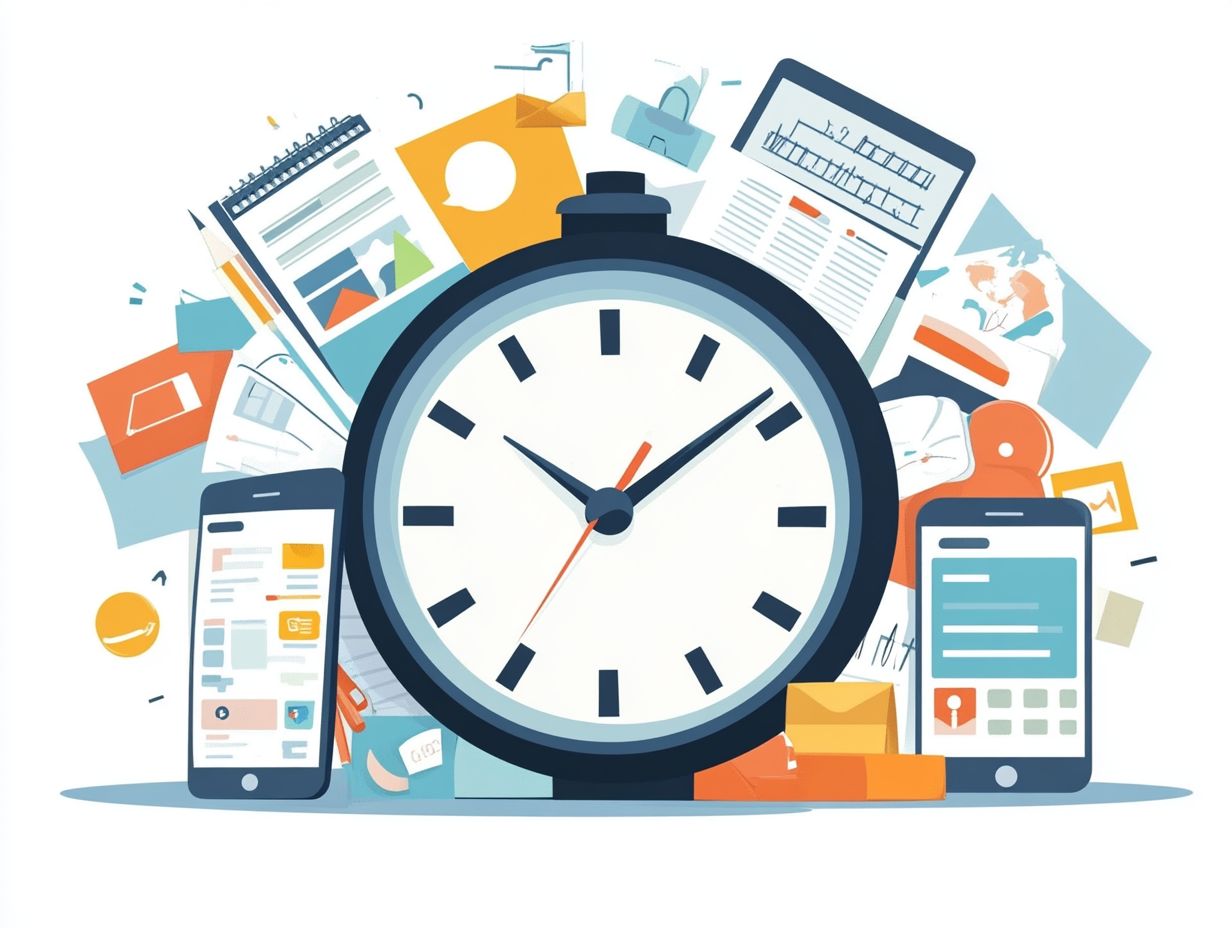
Some common time wasters include checking social media excessively, multitasking, procrastination, unnecessary meetings, and disorganization.
How can I prioritize my tasks to avoid wasting time?
Start today by creating a powerful to-do list that prioritizes your tasks based on urgency and importance. You can also use the 80/20 rule, which means focusing on the 20% of tasks that produce 80% of your results.
How can I avoid getting sidetracked by distractions?
Minimize distractions by turning off notifications on your phone and computer. Find a quiet workspace and set specific times for checking emails and social media.
What can I do to stay focused and motivated throughout the day?
Take breaks and reward yourself after completing tasks. Set specific and achievable goals, and remind yourself of the bigger picture and the importance of managing your time effectively.
Is it beneficial to say “no” to certain tasks or commitments?
Yes! Learning to say “no” to tasks or commitments that are not essential or do not align with your goals can help save time and prevent overwhelming yourself with too many responsibilities.
How can I improve my time management skills to reduce time wasters?
Some ways to improve time management include setting specific goals, delegating tasks, setting boundaries, and regularly evaluating and adjusting your schedule and priorities.

